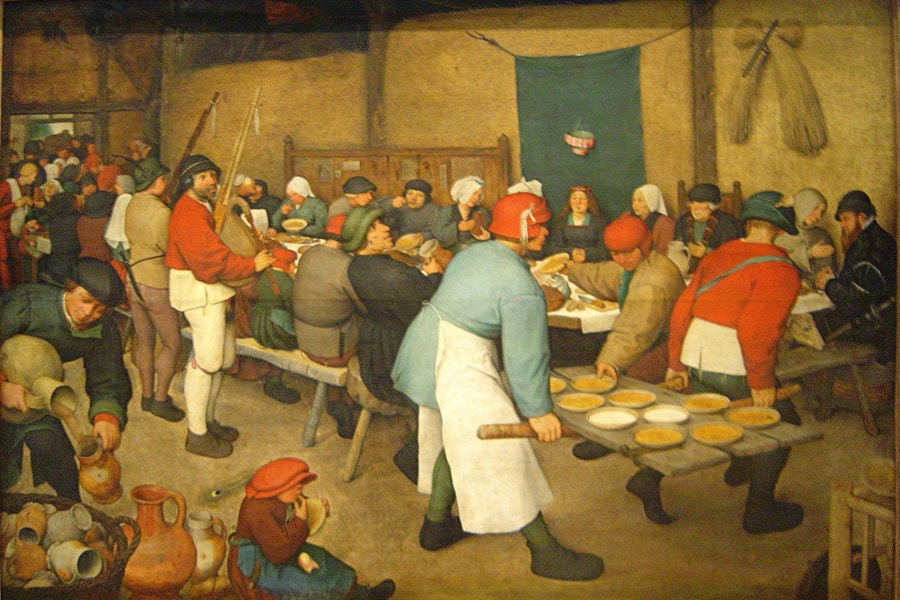I’m still contemplating the surprising, troubling, encouraging supper in Luke 14. Consider the story Jesus tells in the midst of dinner with his Jewish friends – and enemies.
“A certain man was preparing a great banquet and invited many guests” (Luke 14:16). At the time of the banquet the man sent his servant to tell those invited that all had been prepared. “Come, for everything is now ready” (Luke 14:17). Unexpectedly, all those invited began to make excuses for why they could not come to the banquet. They have eminently sensible reasons for why they can’t attend. They are invariably, impeccably polite in their refusal to come to the banquet. One has bought a field and must go see it. “Please excuse me” (Luke 14:18). Another has purchased “five yoke of oxen” and is on his way “to try them out.” “Please excuse me” (Luke 14:19). The third, with perhaps the most reasonable excuse of all, has just gotten married. He has been waiting all his life for this special event. He is on his honeymoon with his sweet bride. “I just got married, so I can’t come” (Luke 14:20).
Who could blame any of these people? And yet when the master of the house received word from his servant that the invited guests had refused to come, he “became angry and ordered his servant, ‘Go out quickly into the streets and alleys of the town and bring in the poor, the crippled, the blind and the lame” (Luke 14:21). This is the second time Jesus has specifically mentioned this select group.
Again, everything seems upside down. The people we would expect to come readily and joyfully to the banquet refuse to attend; they are fully occupied with their own affairs. They have many important things to do, matters they deem more urgent, more relevant, more significant to their lives than the invitation they have received. They expect that if they attend carefully to their affairs – the fertility of a field, the health of a pair of oxen, the joys of marriage to a new bride – their deeper longings will be met. If not, why would they give these things their primary devotion? Why would they make them the center of their attention? Why would they seek after them so ardently, to the extent that they refuse an invitation to a supper that Jesus believes satisfies every thirst and sates every hunger? It is as though those who refuse to attend the banquet have lost their minds, all the while believing they are perfectly sane. “We can feed ourselves,” they reply to the invitation. “We appreciate your efforts on our behalf. We really do. We would attend if we had the time. But our calendars are full. So many important matters press against us. We just can’t squeeze another event in. Our schedule won’t allow it. Please excuse us.”
Simultaneously, as we’ve seen, other people flock to the banquet. They had never expected to be invited. All their lives they had been told, “You have no place here. You are unclean. Don’t you understand why you can’t feed your kids? Don’t you realize why you can’t send them to school? Don’t you grasp why you have only one tunic and one cloak? Why you live in a shack rather than a mansion? Haven’t you noticed that you’re always sick? That you walk with a limp? That your vision is hazy, blurry, dark? That you can’t see past your nose, if that? Well, allow us to explain. The curse of God rests upon you. And all your sufferings, all your pain, are marks of God’s displeasure toward you. You’re branded with the seal of his disapproval.”
All their lives, the poor, the sick, the crippled, the lame, and the blind of Jesus’ day had heard this message. And suddenly, unexpectedly, against all hope, against all the messages of rejection that had leaned against them all their lives, the anointed one of Israel announces that they have a place at his table; a banquet has been prepared for them. Those who never expected to receive an invitation will enjoy a very good meal. And those who were first invited reject the king’s invitation when it comes. How strange. How bizarre. How upside down.
Catch up with Chris’s first three meditations upon Luke 14 and all other previous blog posts at Conversations with Chris.


